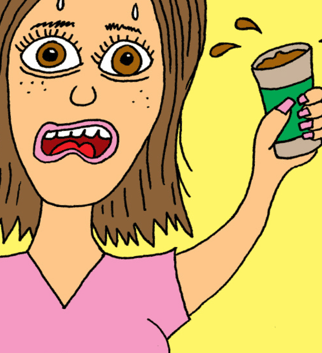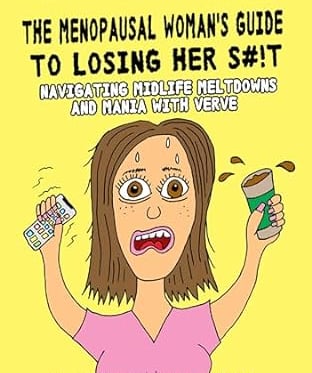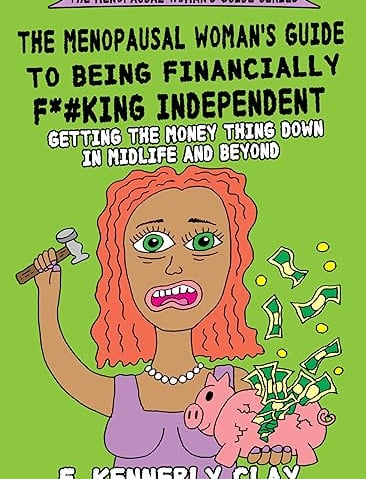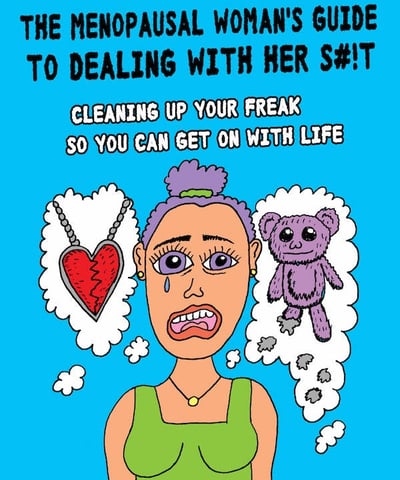
Navigating Menopause and Mental Health
Menopause brings a perfect storm of hormones, physical changes and life stressors. Get humor, intel, and wisdom for dealing with menopause and mental health.
Mental health issues in menopause
Menopause is the ultimate physiological mic drop, a grand finale to reproductive potential. The hot flashes and night sweats, the angry outbursts and raging tantrums, the fucking weight gain not to mention the weird way you've been feeling, like you're just not your "self" anymore.
But the effects of menopause go beyond the physical; they can deeply impact mental health. Whether you're perimenopausal, menopausal, or postmenopausal, hang in there for the fiasco that is menopause and mental health.
What happens in menopause
Let's kick things off with a little Menopause 101. Menopause is officially marked by the absence of menstruation for 12 consecutive months, signaling the end of those bitch of a monthly visits from Aunt Flo. This biological milestone typically occurs between ages 45 and 55 but can start earlier or later, depending on a variety of factors.
Perimenopause, the lead-up act, can begin several years before menopause, bringing with it hormonal fluctuations from hell. In fact, many women get their asses seriously kicked in perimenopause (my hand is raised, by the way). Perimenopausal symptoms sideswipe an otherwise normal life and suddenly you're dealing with extreme fatigue, irritability like you've never experienced before, and a bevy of maladies you never thought would correlate with your 40s (sometimes even 30s).
And here's the truth about menopause: The symptoms of perimenopause may well last, to some extent, for up to 10 years, maybe even longer. I know postmenopausal women who stopped having hot flashes only to have them start up once again. Like, does this shit ever end?
The good news is, it does get better. The insanity subsides. We'll explore why in a moment, but for now...
"The incidence of depression doubles during this time. Women who have struggled in the past with depression or anxiety might also see a resurgence in symptoms."
- Harvard Health
Your hormones are tanking
The main culprits behind menopause's mood mayhem are the hormones estrogen and progesterone, which plummet so fast I swear you can actually feel it. These hormones don’t just control your menstrual cycle; they also play a starring role in brain function. When estrogen and progesterone levels drop, it can feel like your brain's happy place just shut down. Cue the anxiety, depression, irritability, and memory lapses that make you question whether your brain will ever function properly again.
Moods in full swing
Some people waltz through perimenopause and menopause without a care in the world. If you’re one of those people, please leave immediately. This page is not for you. Others totally lose their shit due to a variety of issues like these. Stick around if this sounds familiar. One day you're feeling like a zen master and the next you're crying over a cute cat video. Welcome to menopausal mood swings. Fluctuating hormone levels can make your emotions wildly unpredictable. These mood swings aren't just irritating; they can seriously mess with your mental health.
Brain fog fuckery
Brain fog is more than walking into a room and forgetting why you're there or struggling to recall the name of an actor from that movie you just watched. Brain fog often feels like an intense heaviness in your head and such difficulty concentrating it's nearly impossible to get through a work day or handle simple mental processes that you once did with ease. It can be absolutely crippling, causing you to question your sanity and your ability to operate professionally and personally. This cognitive haze can affect your concentration, memory, and overall mental clarity, making you feel like you're perpetually "lost." Even worse, you used to be on top of your game, deftly managing work and personal life, family commitments, planning and such. Now you feel like your brain is such mush you'll never be able to get your shit together again.
If you or someone you know is in crisis, please call 988, the Suicide & Crisis Lifeline in the United States.
Menopause anxiety making your skin crawl
When worry takes over
Anxiety during menopause can sneak in stealthily. You’ve spent years trying to chill the fuck out and next thing you know you’re obsessing over every possible thing that could go wrong or how uncertain life suddenly feels. Hormonal changes can trigger anxiety symptoms, ranging from constant worry to full-blown panic attacks. Hell, I get anxious just writing this. Waves of anxiety sweep over me sometimes and I have to stop and remember to breathe (or go hide in bed for the rest of the day). It's hard to be a functional human when you're constantly fighting off impending doom.
Sleep disturbances (the 3 a.m. wake-ups)
Sleep and mental health are inseparable. Unfortunately, menopause often brings sleep disturbances thanks to night sweats, hot flashes, and insomnia. If you have a snoring partner, sleep becomes even more challenging. Poor sleep quality can exacerbate anxiety and depression, creating a vicious cycle that's hard to break. Yup. The crazy train has begun and I totally feel you on this. I used to insist on eight or nine hours of sleep a night (pre-perimenopause). Ten-plus years later, I'm grateful for five or six uninterrupted hours.
Fortunately, my need for sleep seems to be less. This may not be clinically grounded information but I know that I have gotten used to getting less sleep and I feel reasonably energized throughout the day, even so. In talking with dozens of women in perimenopause and menopause, this seems to be pretty common with 3 - 3:30 a.m. being the "witching hour" when we come wide awake in the middle of the night on most nights. Although I've gotten accustomed to less sleep and certainly less uninterrupted sleep, I resented it at first - especially when I was dealing with perimenopausal symptoms like debilitating fatigue throughout the day.
A couple of things that worked for me to get back to sleep included:
Melatonin
Listening to sleep meditations
Finding time to nap during the day, if only for 15 or 20 minutes
Menopause survival tip sheet
The Menopause Madness Relief Kit is a hand-curated list of menopausal survival tips from women who've been to hell and back.


The menopausal hormone-depression link
While not every menopausal woman will experience depression, the risk increases during this time. The hormonal turbulence can trigger depression or worsen pre-existing conditions. It’s like your brain's serotonin factory decided to go on strike just when you needed it most.
Symptoms of depression during menopause can include:
Persistent sadness
Loss of interest in activities
Fatigue
Feelings of worthlessness
Your appetite may have changed as well. Perhaps you're overeating or undereating. Menopause depression symptoms may also look like this:
Forgetfulness
Inability to concentrate
Loss of self-esteem/confidence
Some of these symptoms alone seem to come along with menopause, regardless of depression. I assert, however, that it's often this calamity of symptoms that triggers depression in menopause. Who wouldn't be losing their shit if all this was going on?
What's worse is that when you're going through it, it feels like it will last forever, like you'll never get your groove back.
Menopausal depression and stigma
Depression still carries some stigma, and it may be difficult to let others know what you're dealing with. Society often expects us to gracefully age without making a fuss, but menopause and mental health challenges can make us feel completely incapable of getting through life - let alone gracefully. It’s crucial to break the silence and seek support, whether through friends, family, or mental health professionals.
But that's not how I did it.
I was quiet. In retreat. Didn't share with my friends that I was in serious mental health crisis. Months and years later they discovered how bad it had been for me and were shocked. I'm always fun and outgoing, but I no longer related to myself like that. I could tell they were sad and concerned for me and it made me wonder why I hadn't shared more of myself with them. Depression makes you want to go inside yourself and disappear, so that's what I often did.
Nonetheless, I couldn't imagine going through the perimenopausal and menopausal years without an excellent therapist. There's a good chance other things in your life are rearing their ugly heads, from relationship issues to family dynamics to caring for aging parents and even childhood trauma triggers. It's fucking depressing alright! Run, don't walk, to a therapy appointment. Starting a relationship with a therapist who gets you is a great stride in mental health care in menopause.
You'll also find that coping with depression in menopause is an ongoing effort. You try something to see if it helps. Maybe it does, maybe it doesn't. You get professional help. You talk to friends. You get feedback. Try another thing to see if it works, and so on. Accepting that there's no magic bullet or single solution is an important part of the process.


"Women who were prone to anxiety in the past or who had postpartum depression are sometimes more likely to have a panic disorder during menopause. But any woman can develop one." - Cleveland Clinic
Exercise: The natural mood booster


Nutrition: Feed your brain
What you eat can significantly impact your mood and mental clarity. A diet rich in fruits, vegetables, whole grains, lean proteins, and healthy fats can provide the nutrients your brain needs to function optimally. Omega-3 fatty acids, found in fish, flaxseeds, and walnuts, are particularly beneficial for brain health. And while it might be tempting to dive into comfort foods, a balanced diet will serve you better in the long run. I’ve found intermittent fasting (IF) to be effective for fending off excess pounds and also feeling more lean and clean, in general. See if it might work for you.
Mindfulness and meditation
Mindfulness and meditation are like mental chill pills in menopause. These practices can help you stay grounded and manage stress more effectively. Mindfulness involves focusing on the present moment without judgment, while meditation can help quiet the mental chatter. Apps like Insight Timer, Headspace and Calm offer guided sessions that can fit into even the busiest schedules.
I found that putting mindfulness into my day, first thing in the morning, made a huge difference in my mood. Here's how I often start my day:
Meditation app for morning meditation, listening in bed while I'm completely horizontal (I call it the Lazy Girl's Meditation)
Morning coffee by candlelight
A few pages of reading from a book that's just for fun
By building some quiet intentionality and self-care into my day early on, I'm more at ease throughout the day.
Professional help: Not just for emergencies
Therapy isn’t just for when things are falling apart; it’s a valuable tool for navigating the challenges of menopause and mental health. Cognitive-behavioral therapy (CBT) can help you develop coping strategies and reframe negative thoughts. Don’t hesitate to reach out to a mental health professional if you’re struggling. Sometimes, a little external support is exactly what you need to keep your mental health on track.
In fact, you should stop reading this right now and search up a good mental health therapist for menopause. Make your first appointment. You’re gonna need that shit.
Hormone replacement therapy (could change the game)
Hormone replacement therapy (HRT) can be a godsend for some women, alleviating both physical and mental symptoms of menopause. HRT involves taking estrogen, progesterone, or a combination of both to balance hormone levels. There’s also BHRT (bio-identical hormone replacement therapy), often prescribed by functional and integrative medicine MDs. Explore your options. Seek second opinions. Read up on shit.
And keep in mind, there’s no one-size-fits-all solution. Hormone therapy comes with potential risks, so it’s essential to discuss it thoroughly with your healthcare provider.
Ketamine therapy for menopause depression
If you've tried antidepressants and other treatment approaches, you may want to consider ketamine therapy for depression in menopause. Research about ketamine has shown that in low doses, this medication which is legally used for anesthesia in hospitals, can help relieve symptoms of depression.
I can attest to its success in treating my own depression as I dealt for years with anxiety, major depressive disorder, and ultimately, existential depression - a gnawing angst and feeling that there's no purpose to life itself. Picture this: I had a great life, I had great relationships with family and friends, a good job, hobbies that interested me, along with purposeful passion projects. And yet, I couldn't stand living every day. My depression was kicked in further with the loss of elderly family members and my cats.
Through a six-week ketamine therapy program, I gradually came out of the existential dread I was living every single day. I documented my experiences and progress and invite you to connect with me if you wish to ask any questions.
I hate to say it but exercise is critical for mental health - and it's free. Physical activity releases endorphins, the feel-good hormones that can combat anxiety and depression. Whether it's a brisk walk, a dance class, or lifting weights, moving your body can help clear the mental fog and lift your spirits. Plus, it’s a great way to channel any frustration—because let’s face it, menopause can be fucking maddening.
The big laugh, however, is this: Fuck if you feel like exercising when you’re so fatigued you can hardly move and you feel like shit and you’re gaining weight faster than any stupid 10,000-steps a day program can possibly help you.
Nonetheless: Walk. Or do yoga or Pilates. Do something low-intensity and active, especially outside in nature. Now is the time. Don't make a big fuss and don't overcommit. Just do something nice for your body and mind every day.
The big laugh, however, is this: Fuck if you feel like exercising when you’re so fatigued you can hardly move and you feel like shit and you’re gaining weight faster than any stupid 10,000-steps a day program can possibly help you.


Building a menopause support system
Lean on your tribe
Having a solid support system can make a world of difference during menopause. Friends, family, and support groups can provide a safe space to share your experiences and feel understood. Surround yourself with people who lift you up and can offer empathy and encouragement. Remember, you’re not alone in this journey, even if it feels like you’re the only one dealing with it.
Open up the conversation
Talking about menopause and mental health can feel taboo, but breaking the silence is crucial. Share your experiences with others; you might be surprised at how many people can relate. The more I talked, the more I found camaraderie amongst menopausal women and it made me feel slightly less cray-cray, knowing that we were all fucking crazy. Opening up the conversation helps reduce stigma and encourages others to seek help if they need it.
Coping with mental health in menopause
Menopause is challenging, unpredictable, and often downright exhausting. The hormonal upheaval can wreak havoc on your mental health, leading to mood swings, anxiety, depression, and brain fog. But by understanding the connection between menopause and mental health, you can take proactive steps to manage the symptoms and maintain your sanity.
Embrace self-care, stay active, eat well, practice mindfulness, seek out menopause depression treatment, and don’t hesitate to seek professional help. Build a strong support system and keep the conversation about menopause and mental health alive. Remember, this phase of life, like all others, will eventually pass. And when it does, you’ll emerge stronger, wiser, and ready to face whatever comes next with a resilience forged in the fires of hormonal chaos.
Remember: You’re bound to lose your shit, but you’re likely to get it back again at some point.
Books for women who are losing it in menopause
Mental Health
Losing your mind in peri/menopause?
The menopausal woman's guide series
Financial Health
Had enough of financial insanity?
Personal Growth
Triggers? Old stuff kicking up?
Related topics
Explore helpful articles, tips, and advice for women who are losing their shit in menopause.
Community
Stay Connected
© 2024. Eclectic Content, Inc. All rights reserved.






